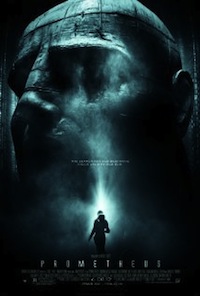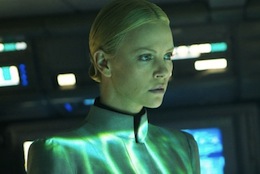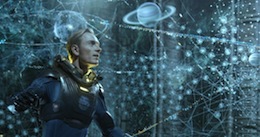 The following review contains the general plot synopsis of Prometheus. If you’re trying to avoid spoilers in any form, proceed with caution, but know that the level of detail in this review doesn’t exceed what has been revealed in the film’s marketing campaign. For a spoiler-heavy review/discussion check this week’s Scene-Stealers Movie Podcast, where Eric, Trey and Trevan all weigh-in on the film. In the meantime, enjoy!
The following review contains the general plot synopsis of Prometheus. If you’re trying to avoid spoilers in any form, proceed with caution, but know that the level of detail in this review doesn’t exceed what has been revealed in the film’s marketing campaign. For a spoiler-heavy review/discussion check this week’s Scene-Stealers Movie Podcast, where Eric, Trey and Trevan all weigh-in on the film. In the meantime, enjoy!
More than three decades ago, director Ridley Scott released Alien, a Science-Fiction/Horror hybrid that skillfully created tension through the use of claustrophobic sets, a crew on the verge of a mental breakdown and an enemy that both looked and behaved like nothing we had seen before. In the years that followed the Alien franchise grew and expanded both in film and in other media, deepening the mythology one minute, and further simplifying it the next.
Enter Prometheus, Scott’s return to the world he helped create in 1979. Written by Lost showrunner Damon Lindelof and Jon Spaihts, the film follows a science team, as they journey to a distant planet with hopes of discovering the origin of mankind. But the all-star cast, which includes Noomi Rapace, Michael Fassbender, Charlize Theron, Idris Elba and Logan Marshall-Green encounter more than they bargain for, as conflicts both on the planet and within theship make the mission much more complicated.
Prometheus exists in the same world as Alien and its sequels, but it wouldn’t be appropriate to call it a prequel. It’s more of a side story. There is one scene in the entire film that isn’t explicitly spelled out for the viewer, and it is the sweeping opening. But no matter how the viewer chooses to interpret the events at the beginning of the film, the jumps in logic, seemingly unconnected scenes and loosely defined characters that follow make the film a chore.
While Prometheus possesses the recipe for great, heady Sci-Fi/Horror, that deals with isolation, faith, and man’s origin and place in the universe, more often than not, the film devolves into petty spectacle, looking more like one of the many imitations that cropped up in the wake of the first Alien film. There are noticeable plot holes that viewers will pick up on regardless of their level of investment in the series and mythology. The only way the film could be any less subtle would be if it contained voiceover narration.
 On a technical level, Scott is at the top of his game. The planet looks foreign and beautifully otherworldly. The costume designs and many of the film’s special effects are detailed and believable. The score evokes the proper emotions without becoming forced or overbearing, and Prometheus deserves to be seen in 3D.
On a technical level, Scott is at the top of his game. The planet looks foreign and beautifully otherworldly. The costume designs and many of the film’s special effects are detailed and believable. The score evokes the proper emotions without becoming forced or overbearing, and Prometheus deserves to be seen in 3D.
Beyond that, there are even some actors who rise above the feeble script they are given. Fassbender is great as David, the ship’s resident linguist. Rapace is tasked with carrying a few too many of the film’s themes on her shoulders, but she still manages to be the film’s conscience. Theron’s character is given some dialog that’s too on the nose, but she still manages to sell her character.
Indeed, many of the film’s problems can be attributed to a script that carries too many of Lindelof’s familiar touches. A civilization with vaguely defined monuments and architecture? Check. An initial mystery that is quickly swept aside with a few lines of dialog? Yep. Characters that go against every previous decision they’ve made because it furthers the plot? You betcha. Smoke monster? No, there’s no smoke monster.
 Some of Scott’s best work has occurred in director’s cuts and the same may occur with Prometheus. There are certainly moments of brilliance in the film, but the finished product fails to effectively be suspenseful, revelatory, subtle or delicate in its themes. General plotting and deeper character emotions are fed to the viewers through clunky, declarative dialog better fit for a prime time network drama than an origin story to one of the greatest science fiction films of all time. And its problems exist whether you take the film as part of a larger narrative, or as a standalone story.
Some of Scott’s best work has occurred in director’s cuts and the same may occur with Prometheus. There are certainly moments of brilliance in the film, but the finished product fails to effectively be suspenseful, revelatory, subtle or delicate in its themes. General plotting and deeper character emotions are fed to the viewers through clunky, declarative dialog better fit for a prime time network drama than an origin story to one of the greatest science fiction films of all time. And its problems exist whether you take the film as part of a larger narrative, or as a standalone story.
If you’re going to see Prometheus, see it in a theater for the visuals alone. Maybe the story issues will fare much better on a smaller screen.




Comments on this entry are closed.